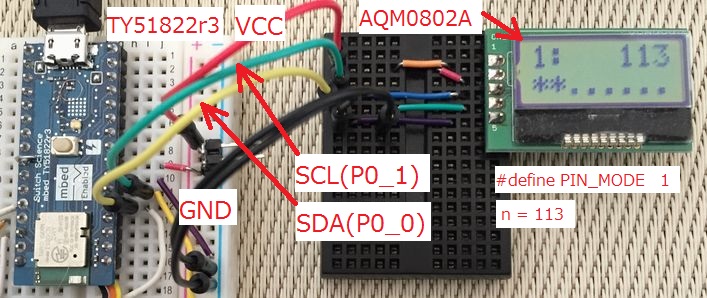Test program for I2C several pin assignment
I2C SDA and SCL pin assignments are very flexible on nRF51.
The nRF51822 has a capability to assign PIN every where using PSELSDA and PSELSCL registers.
mbed library can support this flexibility and you can define your own pins!!
I have NOT tested other functions, UART, SPI, PWM and others but I'm sure that we can use same manner in nRF51822 chip.

Diff: main.cpp
- Revision:
- 0:da7659112ca0
--- /dev/null Thu Jan 01 00:00:00 1970 +0000
+++ b/main.cpp Mon May 02 01:14:34 2016 +0000
@@ -0,0 +1,56 @@
+/*
+ * mbed Application program
+ * ------- Test program for I2C pin assignment -----------------------------------------
+ * Tested on Switch Science mbed TY51822r3
+ * Tested LCD module AQM0802A-RN-GBW, Akizuki 8 characters X 2 lines
+ * http://akizukidenshi.com/catalog/g/gP-06669/
+ *
+ * Copyright (c) 2016 Kenji Arai / JH1PJL
+ * http://www.page.sannet.ne.jp/kenjia/index.html
+ * http://mbed.org/users/kenjiArai/
+ * Created: May 2nd, 2016
+ * Revised: May 2nd, 2016
+ *
+ */
+
+#include "mbed.h"
+#include "TextLCD.h"
+
+#define PIN_MODE 1 // 0 to 4
+
+#if (PIN_MODE == 0)
+I2C i2c(I2C_SDA0, I2C_SCL0); // SDA, SCL
+#elif (PIN_MODE == 1)
+I2C i2c(P0_0, P0_1);
+#elif (PIN_MODE == 2)
+I2C i2c(P0_28, P0_29);
+#elif (PIN_MODE == 3)
+I2C i2c(P0_3, P0_2);
+#elif (PIN_MODE == 4)
+I2C i2c(P0_2, P0_3);
+#else
+I2C i2c(I2C_SDA0, I2C_SCL0);
+#endif
+
+TextLCD_I2C_N lcd(&i2c, ST7036_SA2, TextLCD::LCD8x2, NC, TextLCD::ST7032_3V3);
+
+int main() {
+ lcd.setCursor(TextLCD::CurOff_BlkOff);
+ lcd.locate(0, 0); // 1st line top
+ // 12345678
+ lcd.printf("TY51822r");
+ lcd.locate(0, 1); // 2nd line top
+ // 12345678
+ lcd.puts("Test I2C");
+ lcd.setContrast(0x14);
+ wait(3.0);
+ uint32_t n = 0;
+ uint8_t num = PIN_MODE;
+ while(1) {
+ lcd.locate(n%8, 1); // 2nd line top
+ lcd.printf("*.......");
+ lcd.locate(0, 0); // 1st line top
+ lcd.printf("%u: %5u", num, n++);
+ wait(1.0);
+ }
+}